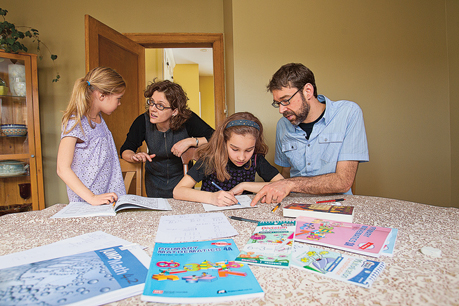
No simple solution
What an insightful and timely article about the new math curriculum (“Have you finished your homework, mom?” Society, March 19). I have three teenage daughters, and when I come home from work I have to put in hours to help with their homework. The stressful thing is trying to use the old-school method to help them and not getting the point across, and staying up trying to learn these new methods can cause migraines. Our education system needs a fix. Thank you for letting me know I am not alone in this.
Sonnie Ikemefuna, Brampton, Ont.
Your article was right on. I am a 60-year-old retired teacher who has always loved math. I knew we were in trouble when math became about not needing to find the correct solution because it is the process that counts. We are basically saying to our kids: “Hey, go build a house—but you cannot have any tools like a hammer or nails or a saw. Also, take all the time you want and, by the way, it doesn’t really have to actually be a house in the end.”
Pauline Therrien, Sudbury, Ont.
I own and operate a 10-man marketing firm in Toronto. We’ve hired young, seemingly bright professionals with university degrees who quiver when asked to calculate even the simplest of figures. Their understanding of even the most basic math is appalling and downright scary. Our system has allowed our young people to graduate from high school and university unequipped to deal with the real world.
Peter Lee, Toronto
I am a mother of three and I have dealt with the new curriculum hands-on while home-schooling. It expects all students to understand and use all methods, creating a cornucopia of confusion. Exams, rather than testing for correct final answers, have become a soup of different methodologies, and they ask students to use each technique with proficiency. My advice to salvage this new curriculum, which I believe has many strengths, is to do as I do: bring back algorithms and shortcuts in mathematics, bring back fact practice and memorization, and, finally, let the students choose the methods that work best for them to complete assignments and exams, and give a grade based on correct results.
Donna-Marie Trimble, Calgary
Let the kids memorize math facts. They need to know them, not figure them out each time. If practice and repetition are effective methods for learning athletic, musical, surgical and other skills, why deprive students by ignoring (or forbidding!) them in the classroom. Supplementary activities and games are fine, but please teach students what they need to know for life. After all, six times nine will always be 54.
Anne MacKay, Halifax
The new “strategies” being taught in math classes are little more than an attempt to obfuscate educators’ inability to teach math. If they had their way, math would not be taught in schools. But the teachers’ unions know this is a line at which even docile Canadian parents would balk. The next best thing is to pass on the responsibility for students’ understanding to parents: if you don’t spend at least 20 minutes teaching your children math every day, don’t blame the teachers. After all, how can a teacher be expected to teach Johnny hard things like addition?
Lubomir Poliacik, Columbus, Ont.
As a teacher, I can tell you that we know how to teach! However, the ivory-tower bureaucrats keep forcing ridiculous new programs on us that we know won’t work. Year after year, it gets worse. Call me old-fashioned, but we were doing a better job of educating kids 30 years ago. Structure doesn’t destroy creativity—it provides a platform to build on.
Laura Vautour, Moncton, N.B.
The article is excellent but one of the captions reads, “Over their heads: Anna and Ross Stokke are both math professors, and find their daughters’ math homework indecipherable.” Ross and I are appalled by recent curriculum changes, which often leave children confused and unprepared for future mathematics. However, this is not because these methods are “over our heads” or “indecipherable” to us, and we did not indicate that this was the case.
Anna Stokke, Associate Professor, Department of Mathematics & Statistics, University of Winnipeg, Winnipeg
Dial-a-scandal
Electoral fraud is a crime, and we cannot afford to assume that our democracy is safe when such an attack on its foundation can be dismissed by the government as mere shenanigans (“Ring around the robocalls,” National, March 19). When the leaders of other countries make such claims in the wake of shady elections, the international community tends to cry foul and, depending on how powerful the country in question is and how much its business means to others in the community, it might even insist on sending in observers to report on and, if possible, help maintain the integrity of the electoral process. Does Canada need such oversight?
Anna Varga-Toth, Ottawa
Perhaps now that Elections Canada has revealed that the bulk of the 31,000 messages it received from Canadians concerning alleged fraudulent robocalls were made via automated form letters on activist group websites, people will tone down the hysteria. Let’s leave the investigation of any wrongdoing to Elections Canada and the RCMP and have Parliament get on with its business.
John Amon, Victoria
Canada the terrible?
I always find it interesting that North Americans are so willing to view foreign governments that we aren’t very friendly with as being too hard on protesters and squashing their human rights (“Putin the terrible,” International, March 19). But when our own governments do similar things—like the riot police on the streets at the G20 summit—that’s okay, because it’s just for security.
C. L. Goheen, Bracebridge, Ont.
Ruffled feathers
Reading “Running a-fowl of the Constitution” (National, March 19), I found myself nodding in agreement with those who feel that bans on small urban flocks of chickens should be eliminated. The comment by Peter Clarke, the chairman of the Egg Farmers of Canada, that “life is better for commercial flocks,” made me laugh out loud. The living conditions of those birds, while technically safe and legal, are neither natural nor humane. Which is why many people would like to have a few hens to produce a few eggs, and to have a connection to the food they eat, and the creatures that provide it.
Elizabeth Baldwin, Plattsville, Ont.
Learning from the pain
I wanted to congratulate Elizabeth MacCallum for taking the bold step of defending the majority of us who depend on opiates to manage the daily, debilitating effects of chronic pain (“The latest opium war,” Health, March 19). It is because of opiates that I am able to get out of bed, exit the house and spend time with my family. Without it, my independence, and ability to function as a normal human, is hijacked by never-ending pain.
Sue Curtis, Toronto
MacCallum says, “No medical school in Canada offers a specialized degree in pain management.” Yet training in chronic pain—a widely recognized subspecialty of anaesthesia—consists of a one-year postgraduate post-residency fellowship offered at most Canadian medical schools. Additionally, pain medicine has been an approved subspecialty of the Royal College of Physicians and Surgeons of Canada since 2010, soon to have a subspecialty-specific exam.
Dr. André Bourgeois, Toronto
Bleepin’ smartphones!
Theatre director John Haynes, who says his venue will be encouraging smartphone use during performances (“View from the tweet seats,” Media, March 19), seems to be completely oblivious to the population who find glaring screens, shrieking voices and constant alarm signals going off to be damned annoying. Eventually we will die out, and then he can tweet for all he’s worth.
Andrew Hartshorn, Ottawa
Pesticide risks
There’s a great deal of science showing people exposed to pesticides are at higher risk for serious illness (“An odd way to encourage a more natural environment,” From the Editors, March 12). The Ontario College of Family Physicians, which represents over 9,000 doctors, studied pesticides around the world and discovered these poisons are linked to brain cancer, prostate cancer, kidney cancer and pancreatic cancer. As well, the college found parents exposed to pesticides are more likely to have a baby with birth defects. Another study, published by the Canadian Paediatric Society, looked at the common weed-killer 2,4-D. Its conclusion: “2,4-D can be persuasively linked to cancers, neurological impairment and reproductive problems.”
Gideon Forman, Executive Director, Canadian Association of Physicians for the Environment, Toronto
Greek referendum
It is true that former prime minister George Papandreou advocated holding a referendum in which Greek voters would approve or reject a new loan agreement (“When democracy is denied, the people take to the streets,” From the Editors, Feb. 27). His proposal raised such concerns, even among his own party, that he eventually resigned. The government of Prime Minister Lucas Papademos is the result of an agreement among three parties representing 83 per cent of the electorate in the 2009 elections. Papademos will run the country until April, when the people of Greece will choose a new prime minister. You falsely assert that the members of parliament who voted against the legislation were expelled from their party by Papademos. The legislation was approved with a two-thirds majority in parliament, and the expulsions were decided by the leaders of the parties that support Papademos. One of them is George Papandreou.
Theodossis Demetracopoulos, Press Counsellor, Greek Embassy, Ottawa
Save on your next flight
KLM offering passengers the option to select their seatmate by looking at their Facebook profile is a great idea (“Select your seatmate,” Business, March 12). I will update my Facebook profile with the picture of a fat, ugly man with an alcoholic’s red nose, and indicate that I drink whisky like water, eat garlic like chips, snore when I’m sleeping and tend to take one shower per month. There’s a major chance that on my next flight I will have plenty of free space, probably enough to lay down and sleep, with no extra cost. Very good idea indeed.
Mike Clements, Sudbury, Ont.

